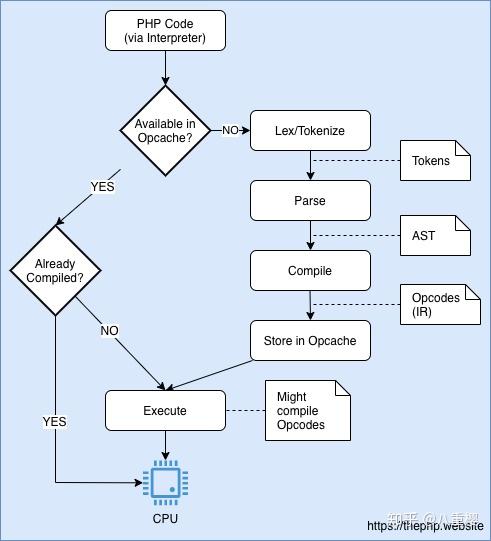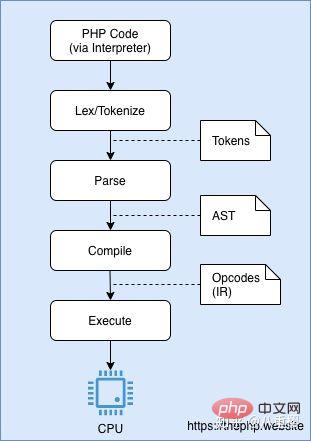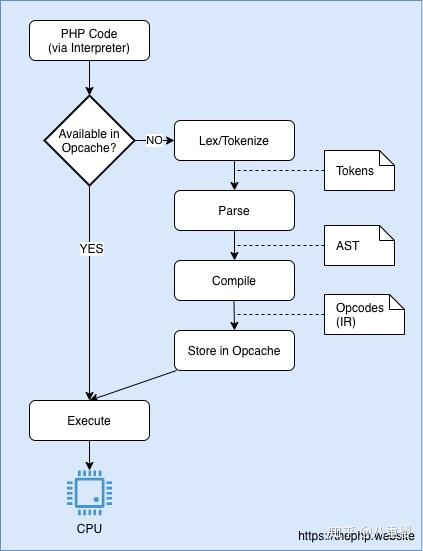Learn about the JIT features of PHP 8!
This article will introduce you to the JIT features of PHP 8. It has certain reference value. Friends in need can refer to it. I hope it will be helpful to everyone.

TL;DR
PHP 8’s JIT (Just In Time) compiler will be integrated into php as an extension Opcache extension Used to convert certain opcodes directly into cpu instructions at runtime.
This means that using JIT, Zend VM does not need to interpret certain opcodes, and these instructions will be executed directly as CPU-level instructions.
PHP 8’s JIT
The impact of the PHP 8 Just In Time (JIT) compiler is unquestionable. But so far, I've found that very little is known about what JIT is supposed to do.
After much research and abandonment, I decided to check out the PHP source code myself. Combining some of my knowledge of the C language and all the bits and pieces of information I've gathered so far, I've come up with this article, which I hope will help you understand PHP's JIT better.
To put it simply: When the JIT works as expected, your code is not executed through the Zend VM, but directly as a set of CPU-level instructions.
That's the whole idea.
But to understand it better we need to consider how php works internally. Not very complicated, but needs some introduction.
How is PHP code executed?
As we all know, PHP is an interpreted language, but what does this sentence itself mean?
Every time PHP code (command line script or WEB application) is executed, it must go through the PHP interpreter. The most commonly used are the PHP-FPM and CLI interpreters.
The interpreter's job is simple: receive PHP code, interpret it, and return the result.
General interpreted languages follow this process. Some languages may eliminate a few steps, but the general idea is the same. In PHP, the process is as follows:
Reads the PHP code and interprets it as a set of keywords called Tokens. This process lets the interpreter know what code has been written in each program. This step is called Lexing or Tokenizing.
After getting the Tokens collection, the PHP interpreter will try to parse them. An abstract syntax tree (AST) is generated through a process called Parsing. Here AST is a set of nodes representing what operations to perform. For example, "echo 1 1" actually means "print the result of 1 1" or more specifically "print an operation, this operation is 1 1".
With AST , it is easier to understand operations and priorities. Converting an abstract syntax tree into an operation that can be executed by the CPU requires a transition expression (IR), which in PHP we call Opcodes. The process of converting ASTs into Opcodes is called compilation.
With Opcodes, here comes the fun part: executing code! PHP has an engine called Zend VM that is able to receive a sequence of Opcodes and execute them. After all Opcodes are executed, Zend VM terminates the program.
This picture can make it clearer for you:

A simplified version of the PHP interpretation process overview.
As you can see. Here is a question: Even if the PHP code has not changed, will this process still be followed every time it is executed?
Let’s look back at Opcodes. correct! This is why Opcache extensions exist.
Opcache Extension
The Opcache extension comes with PHP and there is usually no need to disable it. When using PHP it is best to turn on Opcache.
Its function is to add a memory shared cache layer to Opcodes. Its job is to extract newly generated Opcodes from the AST and cache them so that the Lexing/Tokenizing and Parsing steps can be skipped during execution.
This is a process diagram that includes the Opcache extension:
 PHP’s interpretation process using Opcache. If the file has already been parsed, PHP will get cached Opcodes for it instead of parsing it again.
PHP’s interpretation process using Opcache. If the file has already been parsed, PHP will get cached Opcodes for it instead of parsing it again.
Perfectly skips the Lexing/Tokenizing, Parsing and Compiling steps.
Side note: This is the awesome PHP 7.4 Preloading Features RFC! Allows you to tell PHP FPM to parse the code base, convert it into Opcodes and cache it before executing it.
Do you want to know how JIT is involved in this interpretation process? This article will explain.
What is the effect of Just In Time compilation?
After listening to Zeev’s PHP and JIT broadcast on PHP Internals News, I figured out what JIT actually does.
If the Opcache extension can get Opcodes faster and transfer them directly to the Zend VM, the JIT allows them to run without using the Zend VM at all.
Zend VM is a program written in C that acts as a layer between Opcodes and the CPU. JIT generates compiled code directly at runtime, so PHP can
skip the Zend VM and be executed directly by the CPU. In theory, performance will be better.
This sounds strange because a specific implementation needs to be written for each type of structure before it can be compiled into machine code. But in fact this is reasonable.
PHP’s JIT uses a library called DynaASM (Dynamic Assembler), which maps a set of CPU instructions in a specific format into assembly code for many different CPU types. Therefore, the compiler only needs to use DynASM to convert Opcodes into machine code for a specific structure.
However, there is a problem that has troubled me for a long time.
If preloading can parse PHP code into Opcodes before execution, and DynASM can compile Opcodes into machine code (Just In Time compilation), why don't we use Ahead of Time compilation) What about compiling PHP immediately?
One of the reasons I found out by listening to Zeev's broadcast is that PHP is a weakly typed language, which means that PHP often doesn't know the type of a variable until the Zend VM tries to execute an opcode.
You can check the Zend_value union type to learn that many pointers point to variables of different types. Whenever Zend VM tries to get a value from a Zend_value, it uses macros like ZSTR_VAL to get a pointer to a string in the union type.
For example, this Zend VM handler handles the "less than or equal to" (<=) expression. See how it encodes so many if else branches just for type inference.
Using machine code to perform type inference logic is not feasible and may become slower.
Evaluating first and then compiling is also not a good option because compiling to machine code is a CPU-intensive task. So compiling everything at runtime is also not good.
So how is Just In Time compiled?
Now we know that types cannot be well inferred to compile ahead of time. We also know that compilation at runtime is computationally expensive. So what are the benefits of JIT for PHP?
In order to seek balance, PHP's JIT tries to compile only valuable Opcodes. To do this, the JIT analyzes the Opcodes that the Zend VM is going to execute and checks for possible compilations. (According to the configuration file)
When an Opcode is compiled, it will hand execution to the compiled code instead of to Zend VM. It looks like this:

#JIT interpretation process for PHP. If compiled, Opcodes are not executed by Zend VM.
Therefore, in the Opcache extension, there are two detection instructions to determine whether to compile Opcode. If so, the compiler will use DynASM to convert this Opcode to machine code and execute this machine code.
Interestingly, since there is a MB limit (also configurable) on compiled code in the current interface, code execution must be able to switch seamlessly between JIT and interpreted code.
By the way, this talk by Benoit Jacquemont on JIT in php helped me understand this whole thing.
I'm still not sure when the compilation part was effectively done, but I guess right now I really don't want to know.
So your performance gains probably won't be huge
I hope it's clear now why most php applications don't get that much from using a just-in-time compiler Big performance gains. This is why Zeev recommends that profiling and experimenting with different JIT configurations for your application is the best approach.
If you're using PHP FPM, it's common to share compiled opcodes across multiple requests, but that's still not a game changer.
This is because JIT optimizes computationally intensive operations, and most php applications today are more I/O bound than anything else. If you're going to access disk or network anyway, it doesn't matter whether the processing operation is compiled or not. The timing will be very similar.
Unless...
You are doing something that is not I/O bound, like image processing or machine learning. Anything that doesn't touch I/O will benefit from a JIT compiler.
This is why people now say that we prefer to write native functions in PHP instead of writing in C. If this function were to be compiled anyway, the overhead would be unexpressive.
Fun times becoming a PHP programmer…
Related tutorial recommendations: "PHP Tutorial"
The above is the detailed content of Learn about the JIT features of PHP 8!. For more information, please follow other related articles on the PHP Chinese website!

Hot AI Tools

Undresser.AI Undress
AI-powered app for creating realistic nude photos

AI Clothes Remover
Online AI tool for removing clothes from photos.

Undress AI Tool
Undress images for free

Clothoff.io
AI clothes remover

Video Face Swap
Swap faces in any video effortlessly with our completely free AI face swap tool!

Hot Article

Hot Tools

Notepad++7.3.1
Easy-to-use and free code editor

SublimeText3 Chinese version
Chinese version, very easy to use

Zend Studio 13.0.1
Powerful PHP integrated development environment

Dreamweaver CS6
Visual web development tools

SublimeText3 Mac version
God-level code editing software (SublimeText3)

Hot Topics
 1655
1655
 14
14
 1413
1413
 52
52
 1306
1306
 25
25
 1252
1252
 29
29
 1226
1226
 24
24
 Explain JSON Web Tokens (JWT) and their use case in PHP APIs.
Apr 05, 2025 am 12:04 AM
Explain JSON Web Tokens (JWT) and their use case in PHP APIs.
Apr 05, 2025 am 12:04 AM
JWT is an open standard based on JSON, used to securely transmit information between parties, mainly for identity authentication and information exchange. 1. JWT consists of three parts: Header, Payload and Signature. 2. The working principle of JWT includes three steps: generating JWT, verifying JWT and parsing Payload. 3. When using JWT for authentication in PHP, JWT can be generated and verified, and user role and permission information can be included in advanced usage. 4. Common errors include signature verification failure, token expiration, and payload oversized. Debugging skills include using debugging tools and logging. 5. Performance optimization and best practices include using appropriate signature algorithms, setting validity periods reasonably,
 How does session hijacking work and how can you mitigate it in PHP?
Apr 06, 2025 am 12:02 AM
How does session hijacking work and how can you mitigate it in PHP?
Apr 06, 2025 am 12:02 AM
Session hijacking can be achieved through the following steps: 1. Obtain the session ID, 2. Use the session ID, 3. Keep the session active. The methods to prevent session hijacking in PHP include: 1. Use the session_regenerate_id() function to regenerate the session ID, 2. Store session data through the database, 3. Ensure that all session data is transmitted through HTTPS.
 What is REST API design principles?
Apr 04, 2025 am 12:01 AM
What is REST API design principles?
Apr 04, 2025 am 12:01 AM
RESTAPI design principles include resource definition, URI design, HTTP method usage, status code usage, version control, and HATEOAS. 1. Resources should be represented by nouns and maintained at a hierarchy. 2. HTTP methods should conform to their semantics, such as GET is used to obtain resources. 3. The status code should be used correctly, such as 404 means that the resource does not exist. 4. Version control can be implemented through URI or header. 5. HATEOAS boots client operations through links in response.
 How do you handle exceptions effectively in PHP (try, catch, finally, throw)?
Apr 05, 2025 am 12:03 AM
How do you handle exceptions effectively in PHP (try, catch, finally, throw)?
Apr 05, 2025 am 12:03 AM
In PHP, exception handling is achieved through the try, catch, finally, and throw keywords. 1) The try block surrounds the code that may throw exceptions; 2) The catch block handles exceptions; 3) Finally block ensures that the code is always executed; 4) throw is used to manually throw exceptions. These mechanisms help improve the robustness and maintainability of your code.
 What are anonymous classes in PHP and when might you use them?
Apr 04, 2025 am 12:02 AM
What are anonymous classes in PHP and when might you use them?
Apr 04, 2025 am 12:02 AM
The main function of anonymous classes in PHP is to create one-time objects. 1. Anonymous classes allow classes without names to be directly defined in the code, which is suitable for temporary requirements. 2. They can inherit classes or implement interfaces to increase flexibility. 3. Pay attention to performance and code readability when using it, and avoid repeatedly defining the same anonymous classes.
 What is the difference between include, require, include_once, require_once?
Apr 05, 2025 am 12:07 AM
What is the difference between include, require, include_once, require_once?
Apr 05, 2025 am 12:07 AM
In PHP, the difference between include, require, include_once, require_once is: 1) include generates a warning and continues to execute, 2) require generates a fatal error and stops execution, 3) include_once and require_once prevent repeated inclusions. The choice of these functions depends on the importance of the file and whether it is necessary to prevent duplicate inclusion. Rational use can improve the readability and maintainability of the code.
 Explain different error types in PHP (Notice, Warning, Fatal Error, Parse Error).
Apr 08, 2025 am 12:03 AM
Explain different error types in PHP (Notice, Warning, Fatal Error, Parse Error).
Apr 08, 2025 am 12:03 AM
There are four main error types in PHP: 1.Notice: the slightest, will not interrupt the program, such as accessing undefined variables; 2. Warning: serious than Notice, will not terminate the program, such as containing no files; 3. FatalError: the most serious, will terminate the program, such as calling no function; 4. ParseError: syntax error, will prevent the program from being executed, such as forgetting to add the end tag.
 PHP and Python: Comparing Two Popular Programming Languages
Apr 14, 2025 am 12:13 AM
PHP and Python: Comparing Two Popular Programming Languages
Apr 14, 2025 am 12:13 AM
PHP and Python each have their own advantages, and choose according to project requirements. 1.PHP is suitable for web development, especially for rapid development and maintenance of websites. 2. Python is suitable for data science, machine learning and artificial intelligence, with concise syntax and suitable for beginners.




